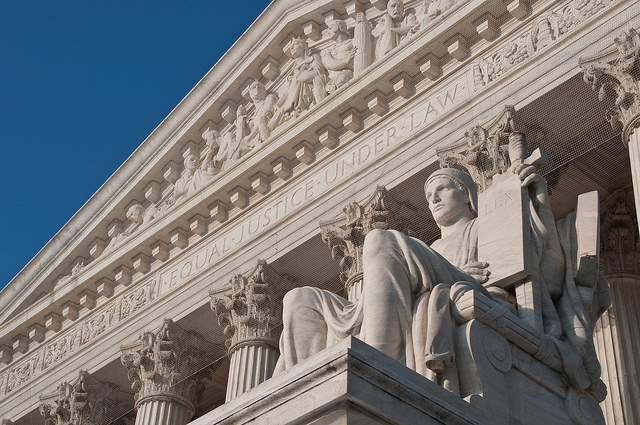Mutual fund fees will soon have their day in the highest court in the land.
The U.S. Supreme Court has agreed to hear a case centered on “excessive” fees collected by mutual funds in 401(k) plans. The case will also determine whether there should be a statute of limitations on lawsuits alleging fiduciary breach. From Investment News:
As a landmark 401(k) excessive fees lawsuit makes its way to the U.S. Supreme Court, industry experts say the court’s decision could set off a domino effect of changes — from the process of choosing plan funds to fiduciaries’ ability to obtain liability insurance.
The case in question is the famed Glenn Tibble v. Edison International, a suit originally filed in August 2007 in the U.S. District Court for the Central District of California. The original suit centers on six retail mutual funds in Edison’s plan menu, which were offered instead of cheaper institutional share classes.
Though the plaintiffs eventually received a 2010 judgment from the district court, they were granted only $370,732 in damages related to excessive fees in three of the mutual funds. The saga continued as both parties battled over fees, bringing the suit to the 9th Circuit Court of Appeals. Last week, the Supreme Court agreed to review the case.
Currently, the defendants are arguing a statute of limitations requires that plaintiffs bring a suit alleging fiduciary breach within six years of the last action constituting the breach.
The ruling will have big implications for retirement plans and the people that run them. From Investment News:
Though some ERISA attorneys interpreted the focus on the six-year statute of limitations as a litigation tactic, other retirement industry experts noted that where the court lands on that issue could shape how fiduciaries serve retirement plans and participants.
“The theory of open-ended liability that could be continuing: On the one hand, you might be more protective of participants, but on the other hand, it can limit the degree to which [liability] insurance is written,” said Jason C. Roberts, CEO of the Pension Resource Institute, a retirement plan consulting firm for broker-dealers.
Aside from the statute-of-limitations issue, the retirement industry will likely be shaken to its core given the fact that the highest court in the land is going to address the issue of excessive fees in 401(k)s. Greater attention to fees by the powers that be could tip the scales even more in favor of cheaper retirement plan offerings.
“It depends on what the Supreme Court is going to do: Will they answer the questions of whether there’s a bright line with institutional versus retail funds,” said Marcia Wagner, a managing director of The Wagner Law Group. “If the Supreme Court says something that clearly, I think the entire industry will move in that direction.”
“I think you’ll see the larger plans, and even the small to midsized plans, going institutional,” Ms. Wagner said. “The salient issue for the Tibble case is that the same funds were available in both institutional and retail. What’s the difference that justifies the fees?”
Read more on the case here.
Photo by Mark Fischer via Flickr CC License
